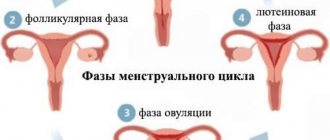An indicator of normal functioning of the reproductive system is a regular menstrual cycle. Normally it is 28 calendar days. Long delays in menstruation or prolonged bleeding are most likely caused by a lack of the hormone of the second phase of the menstrual cycle - progesterone. We will look at how the techniques are related to each other.
Indications for taking Duphaston
One of the main indications for taking Duphaston is amenorrhea, which is caused by impaired ovarian function. Normally, ovulation occurs in the middle of the menstrual cycle, which consists of the rupture of a mature ovary and the release of an egg. At the site of the burst follicle, a corpus luteum is formed, which synthesizes progesterone. Under the influence of this hormone, changes occur in the uterus (proliferation of the endometrium), which contribute to the occurrence of pregnancy and prevent early termination.
The effect of Duphaston on menstruation
Taking Duphaston in the second phase of the menstrual cycle, hormone deficiency is compensated and a correct menstrual cycle is established. Therefore, menstruation should be regular when taking Duphaston, if the cause is correctly identified and treatment is prescribed. Many women want to know before treatment: after starting to take Duphaston, when will their periods come? The most common regimen for taking Duphaston is 1 tablet 2 times a day (20 mg/day) from days 14 to 25 of the cycle. Your period should start on the 28th day, but in practice it happens differently. If your period begins prematurely while taking Duphaston, then perhaps this is the first reaction to taking the drug or the result of an incorrectly chosen treatment tactic. It should be said that after Duphaston there are usually heavy periods. Do not be alarmed if brown, scanty periods appear after Duphaston, this happens at the beginning of treatment, and then the menstrual cycle should become established.
It happens that women decide to take Duphaston on their own to combat amenorrhea. This is very wrong, because thoughtless interference in such a delicate mechanism as the endocrine system can lead to even greater disruptions and problems, which can be much more difficult to cope with. Sometimes such women ask “Why do I drink Duphaston but don’t have my periods?” In fact, a delay in menstruation when taking Duphaston on your own may be the cause of pregnancy or improper self-medication. Therefore, if your period is late, the first thing you need to do is take a pregnancy test.
Delayed menstruation after stopping Duphaston
The main goal of treatment with Duphaston is to normalize the menstrual cycle and, as a result, the onset of a long-awaited pregnancy. If still, then this is a cause for concern. It is possible that the cause of the disrupted menstrual cycle is damage to the pituitary gland or adrenal glands. In this case, the woman needs a full examination: determination of hormone levels, ultrasound examination of the ovaries and adrenal glands. It is advisable to determine the level of progesterone on days 21 and 23 of the cycle. A mandatory procedure is to measure basal temperature in order to monitor the presence of ovulation.
There is a theory that Duphaston can be taken to delay menstruation. Sometimes it actually causes a delay, but in most cases it leads to disruption of the endocrine system.
Thus, having considered the effect of the drug Duphaston on the menstrual cycle, we can conclude that only its reasonable prescription, taking into account all the characteristics of the patient, will give a positive effect from the treatment. Independent uncontrolled use will lead to hormonal imbalance.
When the absence of menstruation is associated with a lack of progesterone, then drugs containing this hormone in their chemical composition can help restore the cycle. Duphaston is one of these drugs. Often women note that after Duphaston there are no periods or they start earlier than expected.
Why is this happening? Do these phenomena relate to pathology? What should you do when faced with such violations? This article will help answer all your questions.
Purpose of the drug
The composition of the drug helps not only to evaluate its properties, but also to determine situations when the use of Duphaston is appropriate. The active component in the drug is dydrogesterone. This substance is an artificial analogue of progesterone, which is actively synthesized by a woman’s body in the second half of the menstrual cycle.
The synthetic substance has properties similar to the natural hormone. "Duphaston" is included in the therapeutic regimen for the treatment of the following pathological processes in a woman’s body:
- Dysfunctional disorder of the ovaries.
- PMS accompanied by severe symptoms.
- Endometriosis.
- Menstrual dysfunction, characterized by increased frequency or absence of menstruation.
- In order to restore hormonal balance before conceiving a child, especially if the patient has a history of miscarriages.
- Uterine bleeding caused by an imbalance of gestagens and estrogens.
- If there is a threat of premature birth to maintain pregnancy.
- Correction of hormone balance during menopause. The drug helps reduce the severity of hot flashes and other symptoms of menopause.
- Infertility due to gestagen deficiency.
How long after taking Duphaston your period comes is interesting to many.
Nature of bleeding
Menstruation after Duphaston can be either heavy or scanty.
A lot of blood provokes a thicker mucous layer (uterine mucosa), and a small amount of secretion can act as a reaction of the body to hormonal destabilization. But after just a few cycles, the discharge should take on its usual characteristics relative to its intensity.
Reading reviews on forums you can come across many complaints about. But this phenomenon is not listed among the side effects of the drug, so the hormonal drug should not be blamed. Most often, severe pain is provoked by the disease that Duphaston fights.
How do your periods go when taking Duphaston?
The following signs of normality exist:
- They begin two or three days after the end of the course. The maximum permissible deviation is a delay of a week or ten days. In other situations, medical advice is necessary.
- The duration of menstruation after Duphaston should be less than usual. But longer periods are not excluded, which is also the norm.
- The daily amount of blood secreted most often decreases -. The volume of menstruation will largely depend on the duration of therapy and the specific disease. It is important not to confuse rejected endometrium with uterine bleeding.
Stabilization of the cycle is possible as early as next month with minor disturbances. A longer recovery period is allowed for problems with the endocrine system and pathologies of the reproductive organs.
special instructions
The medication is effective when used in situations where there is a lack of progesterone. In other cases, the selection of other drugs is required. It is not recommended to take the drug on your own; first you need to find out the source of your poor health.
Duphaston is a potent drug, like other hormonal drugs. There are a number of factors that can affect a woman’s body while taking the drug, including adverse reactions, imbalance of her own hormones, etc.
And it happens, and very often, that after taking Duphaston there are no periods.
Why is Duphaston prescribed?
The main indication for use is amenorrhea, or delayed menstruation, caused by improper functioning of the ovaries and progesterone deficiency.
With effective treatment, ovulation occurs in the middle of the phase with the release of a mature egg. Next, the corpus luteum is formed, producing progesterone. Under the control of the hormone, the endometrium prepares for conception. The substance also prevents spontaneous miscarriage in early pregnancy.
Progesterone deficiency is inherent in such pathologies as:
- Endometriosis.
- Menopause.
- Secondary amenorrhea.
- Painful and...
- Infertility due to luteal insufficiency.
- DUB – dysfunctional uterine bleeding.
- Increased PMS symptoms.
- Risk of miscarriage.
- Ovarian dysfunction.
Dydrogesterone, the active component of the drug, thickens the walls of the endometrium and causes bleeding if conception does not take place. Sometimes taking hormonal pills leads to rapid growth of the endometrium. Then women may experience bleeding even in the middle of the cycle.
Side effects of Duphaston include short-term irregularities in menstruation. The discharge either begins earlier or its intensity changes. Bleeding becomes scanty or more profuse. This condition is not pathological and goes away on its own.
Lack of menstruation: reasons
After treatment with medication, a delay in the arrival of menstruation is quite often observed. It is this factor that causes some concern among women. The regularity of the cycle is an indicator of the state of women's health, so any changes force the patient to consult a doctor.
So, after taking Duphaston there are no periods - what does this mean? There are quite a few reasons why your period comes outside of its due date. Therefore, at the initial stage of diagnosis, it is important to determine the factor that influenced such a failure. A correct diagnosis will allow you to prescribe the correct treatment.
What are your periods after taking Duphaston? There are cases when a delay in menstruation is not an indicator of problems in the body, but simply represents a short pause. In the vast majority of cases, menstruation begins a few days later, and its duration can reach one week. This is considered normal and should not cause concern. A state of stress can increase this period several times, so it is important to calm down and be patient.
If after taking Duphaston there are no periods for several weeks after discontinuation, this may indicate a deviation from the norm or pregnancy.
No periods after Duphaston - is this normal?
Menstrual irregularities are often caused by hormonal imbalances. This condition requires mandatory treatment. To correct menstruation, Duphaston, a hormonal drug containing progesterone, is often prescribed.
It is produced in the second half of the cycle and is responsible for successful fertilization. Duphaston restores hormonal levels, allowing menstruation to begin. But it happens that menstruation does not come after Duphaston, or it gets confused.
Let's figure out why this happens.
What is Duphaston
The active component of the drug is dydrogesterone - a substitute for the natural female hormone progesterone. Duphaston is available in the form of tablets, each of them containing 10 mg of the active ingredient.
The product is well absorbed by the stomach and can be used during pregnancy. Self-treatment is unacceptable, as in some cases the following side effects are possible:
- Headache.
- Various skin rashes.
- Obesity or sudden weight gain.
- Discomfort in the mammary glands.
The drug is available without a prescription in any pharmacies. A single dose is 1-2 tablets, taken 1-3 times a day, but the mass of substances consumed should not exceed 30 mg. Sometimes the drug stops menstruation; if this happens, the woman needs to go to the hospital.
When and to whom is it prescribed?
In addition to menstruation disorders, Duphaston is prescribed for other reasons when chronic deficiency of the hormone progesterone is diagnosed.
To achieve the expected effect, it is important to follow the instructions for use, which are included in each package.
The drug is taken when the following pathologies are diagnosed:
- Amenorrhea;
- Endometriosis;
- Menstruation disorders;
- Luteal phase deficiency;
- Premenstrual syndrome;
- Threatened miscarriage;
- Dysfunctional uterine bleeding.
In addition, it is recommended to take Duphaston in the following cases:
- Severe manifestations of PMS.
- To normalize hormonal levels during menopause.
- For menstrual disorders.
- Before planning a pregnancy.
The drug will be useful only when the above gynecological problems were caused by a lack of progesterone. For this reason, self-medication is unacceptable, otherwise side effects are possible.
When do menstruation begin after stopping Duphaston?
According to gynecologists, patients are often interested in what day their periods begin after stopping treatment with the drug. To understand this issue, you need to know some of the nuances of the female body. After progesterone levels drop sharply, the body receives a signal about its lack. Because of this, the endometrium exfoliates and comes out along with blood secretion.
Usually, menstruation after discontinuation of Duphaston begins on the 2-3rd day. Sometimes you need to wait a little longer for the arrival of “critical days”.
10 days is already considered a deviation; it can be caused by pregnancy or uncontrolled drug therapy. There are situations when menstruation does not occur after completion of treatment.
The reason for this, again, is pregnancy or delay due to destabilization of the ovaries.
Normally, your period comes on the 2-5th day; if this does not happen, you need to see a doctor.
The clarity of the menstrual cycle is a guarantee that everything is in order in the body. The absence of menstruation at the scheduled time should alert the patient. If ovulation is delayed, your period should begin a little later, since the luteal phase has lengthened slightly.
This happens due to a sharp increase in natural progesterone. As soon as the uterine lining is renewed, your period will definitely come. Any deviations other than pregnancy should not be ignored. Before starting treatment, the patient should ask the gynecologist when her period begins, so as not to worry in vain later.
Possible cycle changes after taking
In cases where the treatment was chosen incorrectly or the patient decided to self-medicate, various violations are possible. This may be the absence of menstruation, its early or late onset, as well as heavy, painful bleeding. During treatment with Duphaston, the hormonal balance changes, so after stopping therapy the body must recover.
Menstruation may be disrupted while taking Duphaston if the patient had contraindications or the dosage was incorrectly selected. If you have poor blood clotting, kidney failure or youth, you should not take the drug.
Some women break banal rules, which causes problems. There are times when everything is fine with health, it’s just pregnancy. Below we will figure out whether Duphaston affects menstruation or not, and what deviations are possible.
Lack of menstruation on time
The most common problem is considered to be a delay in menstruation after Duphaston; this is what women worry about the most. It is important for the patient and the doctor to find out the reason for this behavior of the body, because the choice of further therapy depends on this.
In some cases, periods are delayed due to pregnancy or a slight hitch. Typically, critical days come, in extreme cases, after 10 days. Don’t worry, because a bad emotional state will only worsen the situation.
If there are no periods after Duphaston and the test is negative, it is better for the woman to see a specialist. The reason for this may be the following deviations:
- Hormonal disorder - this happens due to a decrease in estrogen levels;
- The presence of problems in the functioning of hormone-producing organs - the thyroid gland, ovaries or adrenal glands react differently to treatment with Duphaston. Sometimes the drug causes malfunctions, as a result of which menstruation does not begin;
- Delayed ovulation - when natural progesterone increases, the mucous membrane is renewed at the wrong time, and the second phase of the cycle begins a little later;
There are different reasons for the absence of menstruation, so if there are delays, it is better to talk to your gynecologist.
Usually, after a course of Duphaston, your periods come on time, so there is no need to worry in advance. Any violations can be easily eliminated after a thorough diagnosis. A doctor should advise what to do if there is a delay; arbitrary “treatment” is unacceptable without a preliminary analysis of hormones and an ultrasound of the organs that produce estrogen progesterone.
Periods ahead of time
It happens that menstruation begins ahead of schedule. The culprits for this are considered to be:
- Incorrect timing of taking the drug - if the scheme is disrupted, critical days come earlier. They take pills in the second phase of the cycle; inconsistencies or disruptions in the pattern cause early menstruation.
- The individual response of the reproductive system to treatment - with proper therapy, bleeding sometimes occurs. Your period may start earlier due to a side effect.
- Insufficient dose - in cases where, after the end of treatment, the level of progesterone remains reduced, menstruation will certainly begin earlier. Only repeated dose adjustment will help.
Before starting therapy, you should definitely consult a doctor, since self-medication always leads to negative consequences.
Heavy and painful periods
Doctors always pay attention to the consistency of heavy periods, as well as the patient’s sensations.
Pain indicates a problem, but without other symptoms, pain should not be a cause for concern if it is tolerable.
Painful periods after Duphaston are most often caused by fear of the treatment itself and possible adverse reactions. The drug has other side effects, but pain is not one of them.
Heavy periods after Duphaston can be caused by two reasons:
- Adverse reactions of the body that are expressed in the blood;
- Lack of the expected result - this happens with endometriosis, which requires other therapy.
Scanty periods after Duphaston occur frequently. The body “has the right” to behave this way, but a decrease in discharge sometimes appears due to missed doses.
This should not be allowed, as they cause hormonal imbalance. The cause of scarcity is considered to be implantation bleeding, when brown secretion appears instead of menstruation.
Sometimes it is caused by pregnancy, so it is better to get a test.
When to see a doctor
You don’t always need to run to the doctor; some symptoms are considered normal. You should visit a doctor if you notice:
- Long periods, which last more than 7 days, are accompanied by pain and the presence of clots.
- Poor health - headaches, rashes on the epidermis, depression.
- Spotting secretion during menopause - during this period it should not be, so spotting indicates problems.
- Very heavy periods – bleeding that lasts more than a week.
- Bloody discharge during treatment with Duphaston.
Despite the fact that the drug is practically safe, uncontrolled and independent treatment is unacceptable.
Reviews
Olga, 27 years old
Hello, I took Duphaston, but no periods. The delay is already 19 days, the doctor says that ovulation is late. I think I'm pregnant, but the test is negative. During treatment there were some adverse reactions: headache and nausea. Girls, who has encountered this, please give me some advice.
Vera, 34 years old
You need to see another doctor. I have been taking Duphaston according to the regimen for three months, there have been no adverse reactions. Perhaps you have an intolerance, it is better to get checked.
Alena, 29 years old
But Duphaston didn’t help me personally, I was pregnant, so I was prescribed 1 tablet. A day later, a bloody spot appeared, then the dose was increased, and the discharge increased. Already in the hospital I drank 4 pieces and almost lost the child. As I was told, intolerance. I decided to read the reviews, almost everyone had concerns, but I didn’t find any serious ones. This is probably my personal reaction to the drug.
Analogues of the drug
There are a number of products whose action is similar to Duphaston, these are:
- Utrozhestan are gelatin capsules that can be taken during pregnancy. The price of the package is about 500 rubles;
- Prajisan - the drug is available in capsule form. Cost for 10 pieces – 270 rubles;
- Iprozhin - there are 15 capsules in a package, the price of a pack is about 400 rubles.
Analogues are used only after consulting a doctor or in cases where Duphaston is not tolerated by the body.
Why didn't Duphaston help?
Unfortunately, the drug is not a panacea for all pathologies. Hormonal imbalances, and as a result, irregular menstruation occur for many reasons. Only a doctor can determine them.
Duphaston does not help when the dose and frequency of administration are violated, there is an individual intolerance, or the woman has decided for herself how and with what to treat.
The drug has side effects, so you should definitely visit a gynecologist before taking it.
Source: https://TvoiMesyachnye.ru/boli/mesyachnye-posle-dyufastona
Pregnancy
During the treatment period, it is recommended to abstain from sexual activity. At the same time, the recovery that occurs while taking the drug can provoke conception. Therefore, the first thing a gynecologist will recommend when complaining about lack of menstruation is to check for pregnancy. This is done through a home rapid test or blood donation for hCG levels.
Why does the drug not work?
After unsuccessful attempts to restore the menstrual cycle, women come to the conclusion that the drug does not work. Yes and no! Such cases arise due to the negligent attitude of doctors towards the female body. You can't measure everyone with the same brush. Ideally, before starting treatment, the level of progesterone in the female body should be determined. Then you can confidently prescribe the dosage and duration of treatment in accordance with the specific situation.
Unfortunately, this is not always what happens in life. Doctors rely on their many years of experience or the achievements of their colleagues. The hormonal drug is prescribed all the time, only the woman will report a cycle disorder, a long absence of menstruation. Similar cases arise when a woman independently attempts to regulate her cycle with medication. Duphaston always works, but it must be used correctly.
Dysfunctional disorder in organs that synthesize hormones
The thyroid gland, adrenal glands and ovaries can react to Duphaston quite unpredictably. Therefore, a disruption in the functioning of one or another organ can lead to the absence of menstruation after taking the drug. To exclude such problems, an ultrasound examination of the adrenal glands, thyroid gland and ovaries is prescribed.
When menstruation begins after taking Duphaston, women often ask. The conditions listed above, with the exception of pregnancy, can cause the patient’s individual reaction to taking the drug, even if the specialist’s instructions are strictly followed. However, most often such situations arise as a result of incorrect administration or self-prescription. It is important not to panic if your period does not come after taking Duphaston.
The effect of dydrogesterone on the menstrual cycle
Taking pills in phase 2 of the cycle compensates for the lack of progesterone and stabilizes menstruation. Usually the treatment goes well and as a result, women's periods become regular.
The doctor selects the dosage of Duphaston individually for each patient. The treatment regimen depends on the diagnostic data and the overall clinical picture. As a rule, the gynecologist sets the daily dose of the medicine and divides it into parts for even administration throughout the day.
The drug is discontinued a few days before the expected date of menstruation. At this stage, a decrease in progesterone levels provokes menstrual flow. It is impossible to predict on what day after the end of taking Duphaston your period will come, since the timing is individual. On average, critical days begin after 3–6 days, minor deviations are allowed.
If blood stains your panties earlier than expected, this indicates two things:
- The body responded to dydrogesterone with premature discharge.
- The woman’s treatment regimen was chosen incorrectly, or the patient voluntarily violated the dosage.
The first period after stopping the medication may look spotty or brown in color. This is fine. When the cycle is restored, the color of the discharge, consistency, and volume will improve.
Let us remind you that Duphaston supports the production of progesterone. When the hormone becomes low, the body sends a signal to the endometrium to tear away from the uterine walls. As a result, the unnecessary layer leaves the female womb along with blood discharge.
As an answer to the question “after stopping Duphaston, when do menstruation begin”, one can give a short waiting period - only 2 - 3 days. If you had to wait one and a half to two weeks for your critical days, this phenomenon should be considered as a pathology.
Early onset of menstruation
Other problems may arise as a result of taking the drug. Some women experience a situation where menstruation begins earlier than expected. The reasons for such violations may be:
- The reaction of a woman's reproductive system of an individual nature. Bleeding may occur even if the prescribed dosage and duration of taking the drug are followed. This refers to adverse reactions and requires contacting a doctor.
- Incorrectly prescribed dosage of Duphaston. If the level of progesterone while taking the drug remains the same, then most likely menstruation will occur earlier than expected. In this case, the dosage will need to be adjusted upward. However, this must be done by a doctor.
- Incorrect timing of taking the drug. The therapeutic regimen determines on what day of the cycle you should start taking Duphaston. As a rule, the beginning of the course falls on the second phase of the cycle, the duration of which may vary for each woman. Inaccuracy in starting the drug leads to premature onset of menstruation.
Sometimes heavy periods occur after taking Duphaston.
Menstruation after Duphaston
Many gynecological disorders of a hormonal nature are treated with the drug Duphaston. Usually, the pills are prescribed for several months, after which they are discontinued and the menstrual cycle is restored.
But in some cases, after stopping Duphaston, there are no periods or they begin prematurely; in order to understand why the body reacts this way to the withdrawal of a hormonal drug, it is worth understanding the possible causes of such manifestations.
While taking the pills (usually this is the second phase of MC), the lack of natural progesterone is compensated, which has a positive effect on the course of the menstrual cycle. If the cause of the disorders is determined correctly, and the treatment is carried out according to the doctor’s recommendations, menstruation begins on time on Duphaston.
Usually, hormones are prescribed from 14 to 25 days. MC, to support the second phase, you will need to drink 2 tablets daily. (day and evening). After ovulation, active growth of the endometrium is observed; upon withdrawal, the drug causes menstruation.
How many days later it will begin depends on the individual characteristics of the body, often this happens after 3 days. since taking the last pill. If after Dufaton there are no periods for more than 7 days.
, then this may be due to a number of reasons.
What may cause the delay
If a woman has taken Duphaston and still does not have her period, there may be several reasons:
Duphaston therapy takes place after ovulation, which is why pregnancy may be one of the reasons for the delay. If conception has occurred, there will be no menstruation after taking Duphaston.
Therefore, in the first days of absence of menstruation, it is necessary to carry out tests that will help confirm or exclude pregnancy. Even if they are negative, it is best to do a blood test for hCG. What to do next and whether you can continue to drink Duphaston should be checked with your doctor.
If it is recommended to continue hormone therapy, it will most likely last several months.
If pregnancy has been ruled out, then it is worth considering another reason for the absence of menstruation after taking Duphaston. During the treatment of some gynecological ailments, complications may develop.
Since Duphaston affects the level of progesterone in the blood, hormonal imbalance may occur, possibly delaying menstrual bleeding. To identify pathology, you will need to test the blood for sex hormones.
If the delay after Duphaston develops due to hormonal disorders, you will need to select a different treatment regimen to induce menstruation.
A delay in menstruation after Duphaston may be caused by delayed ovulation.
A high intrinsic level of progesterone when taking synthetic hormones can delay the renewal of the endometrial layer of the uterus; accordingly, the luteal phase is lengthened, and it is as a result of this that menstruation will come later than expected (7-8 days).
To understand what processes are occurring in the body, you will need to undergo an ultrasound scan. It is worth noting that under the influence of synthetic hormones, a response from the body must occur, it will just be a little later than usual.
- Problems with the ovaries, adrenal glands, or thyroid glands
When menstrual flow should begin, but it still does not, one should not exclude problems in the functioning of other organs that produce hormones. A delay in taking Duphaston may be caused by concomitant pathologies.
If you have not had your period for a long time after Duphaston, you should consult a specialist and undergo a comprehensive examination after stopping hormone therapy. Tests and ultrasound will help determine the reason that caused the delay in menstruation.
If it is confirmed that there are no menstruation due to pathologies of other organs after taking Duphaston, additional treatment is prescribed that will correct the onset of menstruation. You will need to take medications according to the regimen prescribed by your doctor.
Whether such treatment can completely cure a hormonal disease, check with a specialist.
Menstruation began earlier than expected
When taking Duphaston, your period may come much earlier than the calendar date, this is influenced by several factors:
- Features of the female reproductive system. If, after taking a course of a hormonal drug, spotting immediately began (my period arrived), this can be regarded as a side effect of this drug. Until strong discharge begins, it is worth going to see a doctor.
- Insufficient dosage of the drug. If menstruation begins during the second phase of the cycle, the concentration of progesterone in the blood is very low. In this case, drink an increased dosage in accordance with the recommendations of the gynecologist.
- Failure to comply with the drug dosage regimen. On what day the spotting occurs depends on the treatment regimen used. If hormone therapy begins in phase 2 of the cycle, this period may have a different duration. Inaccurate adherence to the schedule does not exclude the possibility that menstruation did not occur on time. It is necessary for the woman to continue taking the pills at the dosage prescribed by the doctor.
Heavy periods after taking Duphaston
Doctors consider one of the most important characteristics of menstruation to be the amount of discharge itself, as well as its consistency. It is also important what exactly a woman feels during her period. A drug such as Duphaston affects hormonal levels, which is immediately reflected in the menstrual cycle.
Menstruation becomes heavy while taking the drug, this can be explained quite simply. Progesterone promotes thickening of the endometrial layer of the uterus, which is exactly how Duphaston acts during the second phase. After some time, tissue rejection occurs.
Therefore, if you have heavy periods after Duphaston, this is a normal phenomenon that does not entail any consequences for the woman’s health.
During menstruation, some women notice not only the release of copious amounts of tissue and blood, but also that the duration of menstruation has increased. This may indicate the following:
- A side effect occurred (uterine bleeding occurred)
- There was no therapeutic effect (for example, with endometriosis).
Those who have taken the drug for a long time report painful menstruation, this is possible due to an increase in the amount of prostaglandins produced. In this case, it is better to switch to taking another hormonal drug, which will be selected by your doctor.
Scanty discharge
The effect of Duphaston on menstruation may be the opposite - scanty bleeding is observed. Under the influence of synthetic hormones, such a reaction of the body is not uncommon; after a few months everything should return to normal, then menstruation comes as usual.
A reduction in the volume of discharge can also be associated with skipping a pill. The body does not receive additional progesterone, which is why it reacts this way. Brownish discharge that replaces menstruation is a symptom of possible implantation bleeding. Continuation of treatment is possible only after the woman is sure that the pregnancy test is negative.
Painful and heavy menstruation
The consistency, amount of discharge and sensations during menstruation are important indicators of this period. When taking Duphaston, menstrual flow may become more abundant. In most cases, we are not talking about a dangerous condition for the body. Progesterone provokes thickening of the endometrial layer. It is this property of the hormone that allows you to maintain pregnancy when there is a threat of miscarriage. When the uterine mucosa is renewed in the absence of pregnancy, there is an abnormally large amount of rejected tissue. The increase in the volume of discharge is especially noticeable for those who did not experience this before treatment.
There are complaints that after taking Duphaston, menstruation lasts longer than usual. This is due to the fact that the uterus needs to free itself from accumulated tissue and it is not always possible to do this in the allotted time. However, both symptoms may also indicate that the drug has negatively affected the body and provoked an adverse reaction, as well as the lack of the expected result from taking it.
Pain during menstruation can also frighten a woman who has taken Duphaston. There are several reasons why such a phenomenon can occur. The drug is not always to blame for painful periods. Adverse reactions that can be caused by Duphaston are:
- Dermatological reactions.
- Hemorrhagic syndrome.
- Nausea.
- Irritability.
- Migraine.
Thus, pain during menstruation may be the result of a problem that Duphaston treatment was aimed at solving. In some women, the drug causes a strong reaction when, against the background of an increase in progesterone, there is also an increase in the amount of prostaglandins.
Scanty menstrual flow is no less rare when taking Duphaston. As a rule, this goes away after one cycle. The volume of discharge is also reduced when you skip a pill.
But when there is no menstruation after taking Duphaston, what should you do?
How Duphaston affects menstruation
The main reason for taking Duphaston is progesterone deficiency and the conditions that are caused by it. These include:
- pain in the lower abdomen and lower back before menstruation;
- history of miscarriages or threatened miscarriages during a current pregnancy;
- absence of menstruation (amenorrhea), rare and scanty periods (oligomenorrhea);
- dysfunctional uterine bleeding;
- endometriosis;
- infertility caused by a lack of luteinizing hormone;
- with estrogen therapy in women with artificial or premature menopause;
- with hormone replacement therapy.
pharmachologic effect
The drug becomes active after oral administration. The main active component is dydrogesterone, which in its chemical and molecular functions is close to the natural hormone progesterone.
But since dydrogesterone is not a derivative of the hormone, when taking it there are no side effects inherent in progesterone drugs, such as estrogenic, androgenic, anabolic, corticosteroid and thermogenic activity.
Unlike estrogen, it does not affect blood clotting processes, does not affect liver function or carbohydrate metabolism. Dydrogesterone affects the formation of the endometrium, preventing its growth and carcinogenesis due to an excess of estrogen.
Treatment with dydrogesterone does not provide a contraceptive effect; the therapeutic effect occurs without suppressing ovulation and maintaining reproductive function. The drug is also successfully used during pregnancy.
After oral administration, the active substances enter the bloodstream through the gastrointestinal tract. The maximum concentration in the blood occurs 2 hours after administration. The drug is destroyed in the liver and excreted in the urine after 72 hours.
Side effects of the drug
The following side effects occur:
- From the hematopoietic system: extremely rarely - hemolytic type anemia.
- From the immune system: rarely – allergic reactions, hypersensitivity to the components of the drug.
- From the side of the central nervous system: migraine-type headaches.
- From the excretory system: rarely - liver failure, may be accompanied by weakness, malaise, signs of jaundice and abdominal pain.
- On the part of the reproductive organs, breakthrough bleeding and increased sensitivity of the mammary glands may occur.
- From the skin and mucous membranes: rarely - skin rash, urticaria, extremely rarely - Quincke's edema, systematic edema.
Contraindications
Sensitivity to the components of the drug, including ididrogesterone. Used cautiously for non-inflammatory liver diseases, hepatosis.
It is not recommended to take the drug if you have problems with blood clotting.
It is not recommended to drink alcohol during Duphaston therapy, as it reduces the effect of the drug.
Consequences of uncontrolled use
Uncontrolled use of Duphaston without monitoring the level of hormones in the blood can cause an unpredictable reaction, the most unpleasant of which can be an effect on the reproductive function of the body, the liver and the level of hormones in the blood.
The decision to prescribe this drug, timing and dose are prescribed by the doctor based on the diseases in the patient’s medical history, as well as the results of laboratory tests.
When should periods start after withdrawal?
Like all drugs with hormonal components, Duphaston can cause changes in a woman’s cycle. Most often, after stopping the drug, menstruation begins on days 3-5, this is considered normal.
Reasons for lack of menstruation
If menstruation does not come after the above, this may indicate a hormonal imbalance, problems with the functions of organs that stimulate the production of hormones, or pregnancy. If, after stopping Duphaston, menstruation is delayed by more than 5 days, you should immediately consult a doctor to avoid serious consequences.
Other cycle changes after taking Duphaston
With Duphaston therapy, menstruation may come earlier. This can happen for the following reasons:
- individual reaction of the body to the drug . With unauthorized and incorrect prescription, uncontrolled use, both dysfunctional bleeding and earlier menstruation may occur. In this case, it is necessary to stop taking the drug and consult a doctor without fail;
- insufficient dose of the drug. Menstruation will begin earlier if the concentration of progesterone in the blood remains at insufficient levels. In this case, adjusting the dose may help, but it should only be prescribed by a doctor;
- incorrect time of administration - Duphaston is taken in the second phase of the cycle, after ovulation. If this period was identified incorrectly, taking the drug may cause premature menstruation.
Another side effect may be heavy and painful periods. The thing is that progesterone is responsible for the formation and thickening of the endometrium. If pregnancy does not occur, the body rejects the endometrial layer instead of menstrual blood, in which case there is too much rejected tissue, so periods can be heavy and prolonged.
There are also scanty discharges, this indicates hormonal changes in the body.
How to restore a cycle
In case of any cycle disruption while taking Duphaston, you must consult a doctor to adjust the course, dosage or completely cancel and replace the drug. Self-adjustment of the dose or replacement of the drug is strictly not recommended.
When to see a doctor
You should immediately go to the hospital if the following side effects occur while taking Duphaston:
- bleeding of unknown nature occurred;
- with severe abdominal pain;
- if symptoms of jaundice occur: general malaise, yellowness of the skin and sclera, signs of intoxication of the body;
- with symptoms of blood clotting disorders, with changes in laboratory blood test parameters.
- if pregnancy is suspected, as well as problems with an existing pregnancy.
Source: https://DrLady.ru/menstruation/kak-djufaston-vlijaet-na-mesjachnye.html
In what cases will the drug help a woman?
Irregularities in a woman's menstrual cycle occur due to the influence of internal and external factors. Duphaston is prescribed in the absence of visible gynecological diseases. The medicine will help in such cases:
- failure due to climate change;
- disruption of a woman’s menstrual cycle due to stress, nervous tension;
- low progesterone levels due to excessive weight or excessive thinness of a woman;
- excessive physical activity;
- failure due to treatment of other diseases of the female body not related to the reproductive system.
Contraindications to taking Duphaston are liver failure, bleeding disorders, and the presence of a malignant tumor. While taking the drug, you should avoid alcohol. If there is an individual intolerance to the components of Duphaston, you should consult a doctor. In most cases, the drug is discontinued.











